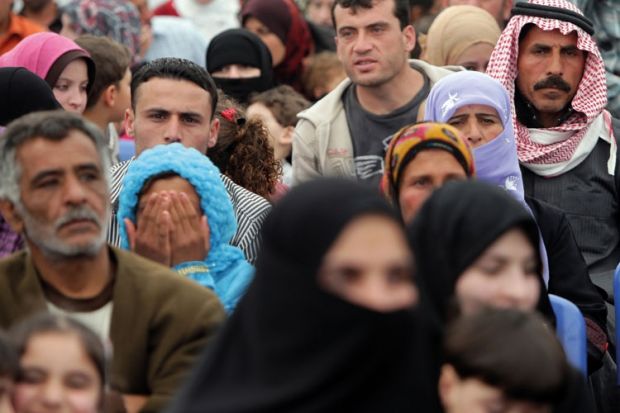Source: Getty
‘Bleak’ situation: Lebanon offers refuge but few study opportunities
The major hurdles for refugee Syrians seeking to study or work in Lebanese universities are set out in a sobering report.
Produced by the Institute of International Education and the University of California, Davis Human Rights Initiative, The War Follows Them: Syrian University Students and Scholars in Lebanon starts by setting out the scale of the problem. There are now more than a million Syrian refugees in Lebanon, with perhaps 360,000 of them aged between 15 and 24 and as many as 70,000 of them students in Syria until the crisis. Yet there are at most 10,000 and maybe as few as 6,500 Syrian students currently enrolled in Lebanese universities, and that includes those who came before the conflict.
“The overwhelming majority of displaced Syrian students in Lebanon”, note the authors of the report, “are not continuing any form of higher education or advanced training…In addition to severe resource constraints and physical threats, unwritten discriminatory policies make Syrian students and academics vulnerable to exclusion from higher education in Lebanon. At the same time, the country’s weak regulatory system allows for flexibility and innovation in creating solutions at local levels.”
The War Follows Them also points to a number of explanations for this “bleak” situation. Incoming potential students are often hampered by high tuition fees, lack of resources, generally lower levels of proficiency in English and French, and “very real…security concerns…particularly for those who may have been politically active or who hail from anti-regime areas”.
The Lebanese government, meanwhile, has failed to “articulate a coherent policy towards Syrian refugees”. With the country’s higher education sector “now probably more divided by sectarian affiliation and geography than at any time in the past”, additional factors are concerns that an influx of largely Sunni Syrians may upset the demographic power balance, stirring memories of the generation-long Syrian occupation of Lebanon, and continuing tense relations with the large population of Palestinian refugees.
Syrian academics hoping to find jobs in Lebanon also face a number of challenges. One was offered a position only on condition that his wife signed a contract agreeing not to work in the country. And a recent decree by the Syrian Ministry of Education denying all requests for sabbatical leave means that many scholars are presented with a stark choice between “risking their short-term security by remaining in Syria, and jeopardising their long-term career and source of livelihood by leaving”.





